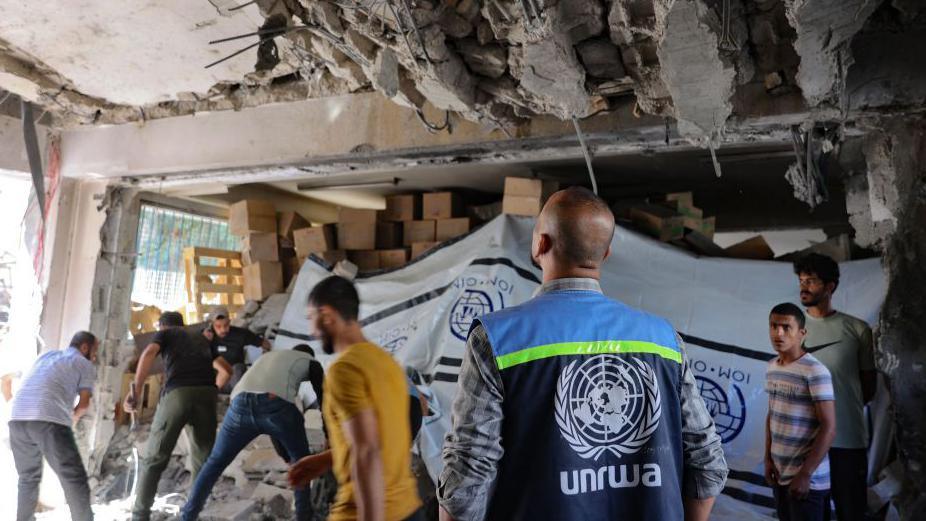
Gaza Aid Crisis: Israel’s Ban on UN Palestinian Agency Sparks Global Concern

Recent developments in Gaza have escalated the ongoing humanitarian crisis as Israel’s parliament passed legislation effectively banning the UN Relief and Works Agency for Palestine Refugees (UNRWA) from operating within Israel and East Jerusalem. This restriction impacts UNRWA’s ability to provide critical aid to Palestinians, particularly in Gaza and the West Bank, where millions depend on its support.
The Ban on UNRWA and Its Implications
Israel’s new law will ban all UNRWA operations in Israel and East Jerusalem, and also restrict contact between UNRWA staff and Israeli officials. This ban could severely limit UNRWA’s humanitarian efforts, as cooperation with Israeli authorities is essential for the transfer of aid into Gaza, which remains under a blockade controlled by Israel.
UNRWA has long provided essential services, including healthcare, education, and food distribution, to millions of Palestinian refugees in Gaza. Nearly all of Gaza’s 2 million residents depend on UNRWA for basic services. As a result, the ban could lead to a sharp increase in humanitarian suffering, potentially affecting hundreds of thousands of children who rely on UNRWA schools and healthcare facilities.
Global Reaction to Israel’s Decision
International leaders have expressed deep concern over Israel’s decision, calling it a serious impediment to humanitarian aid efforts. UN Secretary-General António Guterres warned that the ban “would be detrimental to the peace process and regional stability,” while UNRWA Commissioner-General Philippe Lazzarini condemned it as a violation of international law, stating that it would intensify the suffering of Palestinians already enduring “sheer hell” in Gaza.
Key international figures, including UK Foreign Secretary David Lammy and US State Department representatives, have voiced opposition, underscoring that UNRWA plays a “critical role” in providing humanitarian aid. Lammy described the ban as “totally wrong,” while US officials acknowledged the vital function UNRWA serves in the Gaza Strip, where an overwhelming majority relies on aid for survival.
Israel’s Perspective on UNRWA
Israeli leaders have long criticized UNRWA, alleging that it has ties with Hamas in Gaza. Prime Minister Benjamin Netanyahu stated that UNRWA workers “involved in terrorist activities against Israel must be held accountable,” though he insisted that humanitarian aid should still reach civilians in Gaza.
The Israeli parliament, Knesset, approved the new legislation with an overwhelming majority. Yuli Edelstein, chairman of the Knesset’s foreign affairs and security committee, accused UNRWA of being a “cover for terrorist actions” due to alleged connections between UNRWA and Hamas. These claims have heightened tensions, although UN investigations have not provided substantial evidence linking the agency to Hamas beyond isolated incidents.
Humanitarian Crisis in Gaza
The situation in Gaza has deteriorated rapidly, with ongoing military operations intensifying the need for humanitarian assistance. In the north, where Israeli forces are actively conducting operations, hundreds of thousands of Palestinians face dire conditions. Many Palestinian residents and international observers fear that Israeli military tactics may lead to widespread displacement, as access to food, water, and medical supplies becomes increasingly limited.
According to Volker Türk, UN human rights chief, “the Israeli military is subjecting an entire population to bombing, siege, and risk of starvation,” referring to the north Gaza crisis. Despite the Israeli government’s assurance that civilians are not being targeted, humanitarian groups report widespread suffering and disruption to aid operations, with conditions worsening daily.
The Broader Implications for Peace and Security
The international community views Israel’s restrictions on UNRWA as a significant step back for peace efforts in the region. UNRWA has long been a stabilizing presence, helping to maintain essential services and supporting refugee populations in volatile areas. Without its presence, the likelihood of increased hardship and regional instability grows.
As the humanitarian crisis in Gaza deepens, the world faces a critical challenge. Balancing security concerns with the humanitarian needs of civilians is essential for ensuring that innocent lives are not caught in the crossfire. Global leaders continue to call for Israel and the international community to find a compromise that safeguards both security and humanitarian aid.
Conclusion
The recent legislation banning UNRWA operations has raised significant humanitarian concerns, particularly for the millions of Palestinians dependent on the agency’s services in Gaza and the West Bank. While Israel emphasizes security, the restriction on aid could exacerbate conditions for Palestinians living in some of the world’s most challenging environments.
The international community watches closely as tensions rise, hoping for a solution that can address both security and humanitarian needs in Gaza. As global leaders urge Israel to reconsider, the situation remains critical, with the future of Gaza’s most vulnerable populations hanging in the balance.
Read also our article about Top 5 UNESCO Heritage Sites to Visit in Nigeria.



